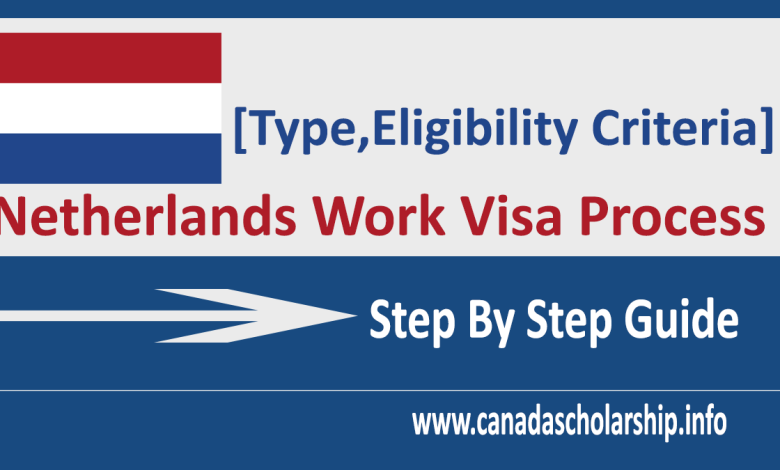
Netherlands Work Visa Process for 2023 – Complete Procedure
Netherlands Work Visa Process For 2023 – Welcoming you all with another great opportunity! We have a new deal that allows you to work and make your future abroad. All International Candidates looking forward to finding work and a career in the Netherlands are therefore encouraged to apply for a Netherlands Work Visa.
If you want to stay in the Netherlands for more than 3 months, you’ll need a residence permit. There are work visas that can also allow you to work without being fined.
This article will explain who can work in the Netherlands without a work visa, while those with visas will have a much easier time of it. Also, this article will explain how to receive your permit and get started working. To learn more, please continue reading.
Overview of Netherlands Work Visa Process for 2023
- Country: Netherlands
- Post Title: Netherlands Work Visa Process
- Eligible Countries: Foreigners
- Category: Work Visa
Determine the Appropriate Work Visa Category
The Netherlands has a number of work visa categories, each of which is intended to accommodate various forms of jobs and people. The primary work visa categories in the Netherlands are described as follows:
Program for Highly Skilled Migrants (HSM):
Highly talented professionals from outside the European Union (EU) or European Economic Area (EEA) who receive a work offer from a reputable Dutch firm are eligible for the Highly Talented Migrant program. Individuals with specific knowledge, experience, or skills should apply for this category of visa. The program offers simplified procedures and permits the visa holder to work in the Netherlands for any firm.
Year of Orientation for Highly Educated Individuals:
International graduates from certain Dutch higher education institutions or other foreign universities are the intended audience for the Orientation Year visa. It gives them up to a year after graduation to look for work or launch a business in the Netherlands. The visa offers the chance to get real-world experience and perhaps advance to a work visa or resident status.
The EU Blue Card
Highly qualified non-EU individuals who have a job offer in the Netherlands that satisfies particular wage and educational standards are eligible for the EU Blue Card. The Highly Skilled Migrant program and the Blue Card are comparable, although the former has several advantages, such as a quicker application process and the ability to transfer to another EU member state after 18 months.
Visa for Self-Employed Workers:
For anyone who wants to start and run their own business in the Netherlands, there is the Self-Employed Work visa. Applicants must show that their venture is creative, advantageous to the Dutch economy, and profitable. It is crucial to meet specified requirements regarding experience, education, and investment.
The Working Holiday Visa
For anyone between the ages of 18 and 30 who are citizens of certain nations with whom the Netherlands has bilateral agreements, the Working Holiday visa is available. With the help of this visa, young people can spend up to one year living in the Netherlands and working temp jobs to pay for trips or exchange programs.
Visa for Seasonal Work:
People who work in seasonal industries like agriculture, horticulture, or tourism are eligible for the Seasonal Work visa. Employers may use this visa to temporarily engage non-EU workers to fill temporary labor needs during busy times of the year.
- It’s crucial to remember that each category of work visa has its own unique requirements and application processes. To ensure accurate and current information for a certain visa category, checking the Immigration and Naturalization Service, IND, official website or consulting a professional advisor is advised.
Employer’s Role and Sponsorship
In order to obtain a work visa in the Netherlands, the sponsorship and involvement of the employer are essential. The function of the employer and the notion of sponsorship are explained as follows:
Recognized Sponsor Employer:
The employer must be approved as a sponsor by the Dutch Immigration and Naturalization Service (IND) in order to hire a non-EU worker. Employers who meet certain requirements, such as having a solid track record, adhering to Dutch laws and regulations, and proving a real need to hire non-EU workers, may submit an application to become a recognized sponsor.
Obligations and Responsibilities of the Employer
Once an employer is acknowledged as a sponsor, they are subject to a number of duties and requirements when it comes to sponsoring a foreign worker. These consist of:
- Offering an Employment Contract: The employer is required to make the employee a job offer stating all of the terms and circumstances of the employment, including pay, working hours, and duties.
- Providing a Sufficient Wage: The employer must provide a wage that satisfies the minimum income requirements established by the IND for the particular work visa category. Additionally, the pay must be competitive with market rates for the job and the employee’s capabilities.
- Respecting Labor Laws: The employer is required to respect Dutch labor laws and regulations, ensuring that workers are treated fairly, that workday limitations are respected, and that health and safety rules are followed.
- Serving as a Liaison with IND: During the visa application process and the duration of the employee’s stay in the Netherlands, the employer acts as a point of contact between the employee and the IND. To support the employee’s visa application, they might be required to provide pertinent paperwork and offer the appropriate details.
Application Sponsorship for a Work Visa:
- The employer is essential in sponsoring the employee during the application procedure for a work visa. This entails:
- Supplying Necessary Documents: The employer is required to supply any supporting documentation needed by the IND for the particular work visa category, including the employment contract, evidence of the employer’s recognized sponsor status, and any other documents.
- Coordination with the Employee: To precisely collect and submit the necessary documentation within the allotted timeframe, the employer and employee must cooperate. In order to ensure that all relevant information is submitted, the employer may help the employee through the visa application procedure.
- Compliance: The employer is in charge of making sure that all the data given for the visa application is correct and adheres to the standards established by the IND. They should also be informed of any updates or changes to immigration laws that might have an impact on the worker’s visa situation.
It’s critical for employers and employees to be aware of their respective obligations during the sponsorship process. A smooth and successful work visa application depends on open communication, teamwork, and adherence to Dutch immigration laws.
Who doesn’t need to be required to obtain a Netherlands work visa?
Nationals from the European Union countries and Switzerland are not required to acquire a Dutch work visa. They’ll need to register themselves with their local personal record system and get a Citizen Service Number if they plan on staying for at least four months, though.
You need a visa to travel to the country. Check the regulations, know what your options are, and plan accordingly before you decide to go!
EU and Swiss Nationals are not obligated to get a residence verification if they are family members of another EU or Swiss national. However, anyone who is a foreign worker wanting to live in The Netherlands will have to use this new law.
Any other non-EU/EEA candidate must get a residence and work permit in order to be admitted; otherwise, they are ineligible to enter the country. You can also choose a Single Permit (commonly referred to as GVVA), which combines the residence and work permits into one document. You would have to purchase an annual or bi-annual permit.
Requirements for a Netherlands Work Visa?
The requirements for a work visa depend on what you are applying for and the availability of the Dutch Residence permit. You must still follow certain terms and rules to qualify for one.
Some Kinds Of Netherlands Work Visa.
There are the following types of work visas with each of their requirements. There are student visas, work-related visas, and other types such as:
- Regularly paid worker, Seasonal Labor, Intra Corporate transfer, Highly Skilled Migrant, European Blue Card, Orientation year for highly educated persons, Researchers under Directive (EU) 2016/801 & Self-employed individuals/Entrepreneurs/Freelancers, etc.
Here’s a list of work visa types and their requirements and conditions.
First #1 Regular employment (employee).
International candidates could apply for this type of work visa in order to work with a company or employer in the Netherlands. You must fulfill certain requirements, including the following:
- If you plan on residing in the Netherlands, you need to have a work contract in place. If no work contract is present, the sponsor may”
- I’m sorry, but you must be active over the age of 23 to earn a paycheck.
- You must present proof that you are not eligible or unable to work in The Netherlands because you are from there.
Second #2 Intra Corporate Transfer
Those candidates who are employed by a company outside the EU and need to be transferred to another branch in the Netherlands will be issued an Intra Corporate Transfer work visa for the Netherlands. This visa has the following requirements:
- Citizens of non-EU countries must not be applying for jobs in the Stockholm office. For EU/EEA applicants, please see our listing outside the EU and Switzerland. If you’re looking for a management job, please contact us.
- Fluency in English must be above 95%, the applicant has to have worked for three months at the company, they need experience and qualifications sufficient for their position, and they must meet your salary requirements.
- The company must first show how much economic activity there is in the Netherlands. Then, it must follow the tax rules for that country.
- You must be placed in training programs and not in normal employment programs.
Third #3 Seasonal Labor.
This type of visa is for international workers who work in the agriculture sector in the Netherlands. The validity of this visa is 24 weeks, but it requires a handful of things from your side.
- Contract of employment
- Applicants must obtain a Single Permit, which includes work and residence permits.
- Applicants must earn minimum wage.
Fourth #4 Highly Skilled Migrant.
Highly Skilled migrant visas are available to those individuals who have technical skills that contribute directly to the Netherlands’ knowledge-based economy.To get a work visa in Europe, applicants under 30 years of age must earn at least €3,299 and those over 30 must earn at least €4,500. All the requirements for this work visa need to be fulfilled as well.
- A contract between you & your employer or research institute in the Netherlands.
- If you are applying as a scientific researcher, your application should be submitted to a department, who will then sign your contract and send the contract to the institution of your choice.
- The University won’t hire you unless they have a written contract with you. This is to confirm your ability to fill the position.
- Assuming you are applying to a residency program as a medical student, You cannot train as a specialist without approval from the SGRC, MSRC, or HVRC. In addition, the institute you are training at has to be one that is approved by these committees and has been set up by them.
- Physicians must be registered with the Individual Healthcare Professions, also known as the BIG register
Fifth #5 Self-employed individuals/Entrepreneurs/Freelancers.
Self-employed individuals, entrepreneurs, and freelancers can apply for a work visa in the Netherlands to start their own businesses. The startup visa is also called a “work visa”.
Sixth #6 Orientation year for highly educated persons
Highly educated, highly skilled people tend to change their career fields every few years
The visa is for students who have completed their education in the Netherlands, and whose study visa expires. You can learn more about extending your stay on studying in the Netherlands. To get this renewed, you will need one of the following: a KEU visa; a SE visa; or an ‘A’-visa
- We are hiring an experienced scientist with a Masters’s degree and 5 years of experience in their field. This individual’s main responsibility will be to conduct scientific research and oversee the development of our product in the Netherlands.
- What I did was obtain an MA degree within an Erasmus Mundus Masters’s Course. Inside the Cultural Policy Act, there exists a postdoctoral study or Ph.D. option that can help you complete your education abroad and receive recognition for it as well.
Seventh #7. Researchers under Directive (EU) 2016/801.
Any person who wants to work as a researcher in the Netherlands will need to meet certain qualifications.
- You need to find a university that’s acceptable to the Institute, and you must have the qualifications to be allowed as a researcher. The project also needs to be approved by the institution before that can happen.
- You have a contract with a research institution. You must be receiving an appropriate amount of money each month from them.
Eighth #8 European Blue Card.
Non-EU citizens have the option to reside and work in the Netherlands without a work permit. They just need other forms of entry into countries like Denmark, the UK, or Ireland. Conditions vary – you’ll need to check with your embassy.”
- Nuffic must evaluate the applicant’s higher education certificate to make sure they meet specific requirements. If they pass, you will receive a contract of employment valid for at least 12 months.
- To qualify for an EU Blue Card, applicants must make at least €5,272 every month for the past three months. They’ll need to include documentation of this in their application.
- The company’s branch outside the Netherlands will have to follow the tax rules and abide by the rules of law in that country.
What is the application process for Netherlands Work Visa 2023?
The following steps will help you apply for a work visa. Apply electronically on the website, submit photo ID & child stroller, address all questions to expedite the process, and provide documents in advance.
- Find a job or work as a freelancer
- If you have a new job and your prospective employer wants to make sure that you’re eligible, they’ll likely need to verify your eligibility for the work permit as well, on their own.
- We forwarded your application to the Dutch Ministry of Employment (UWV)
- After evaluation, results will be forwarded to INS
The people who are not eligible for the single permit are:
- Short-stay visa holders, Students, Family members of single permit holders, Service providers, Croatian nationals & Seafarers.
FINAL CONCLUSION
The Netherlands Work Visa is an important step to take if you are planning on moving to the Netherlands. This visa offers a lot of benefits including tax codes, healthcare, education, and protection of your property when you’re not working. Register below to learn more about applying for this visa: https://workpermit.eu/

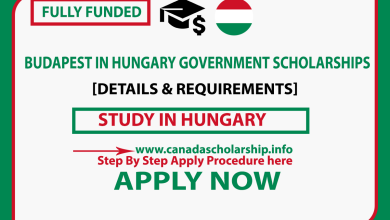
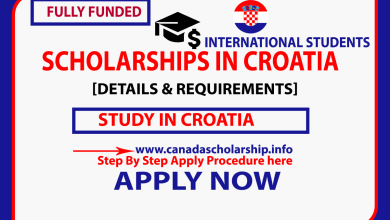
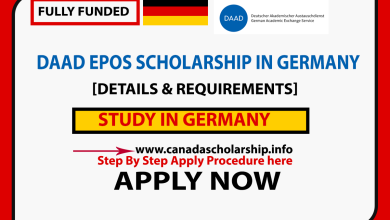
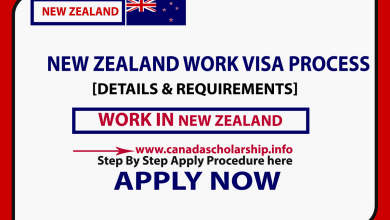
One Comment